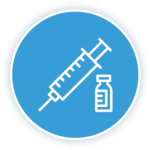
Quit Smoking
We know smoking is bad for us. Tobacco smoke contains more than 4,000 chemicals, over 250 of which are known to be toxic. It continues to be the main cause of a myriad of lung conditions, including Chronic Obstructive Pulmonary Disease (COPD) and childhood asthma, and diseases such as cancer and heart disease. Unfortunately, it’s the case that one in two smokers will die of a tobacco-related disease.
We also know it’s an addiction and quitting is far from easy. Smokers can double their chances of success by making a Quit plan and reaching out to their local smoking cessation clinic or calling the HSE Quit team on Freephone 1800 201 203. Prescription medication and over-the-counter nicotine replacements can further boost success rates in quitting for good. Never give up giving up – if at first you don’t succeed, you can learn something for the next time you try. Check out QUIT.ie.

Breathe Easy
The air quality in our environment impacts our lung health. It can be from indoor pollutants such as smoking, fumes from cooking, heating or cleaning materials, and airborne allergens from pets, plants, dust mites or dampness/mould. Equally, it can be outdoors from the burning of fuels from our home heating boilers, passing traffic or local industry.
But you can do something about it. Make your house a smoking-free zone and keep it well-ventilated, particularly if risky fumes or dusts could be present. Play your part in reducing outdoor air pollution – use public transport or car-share for the daily commute or school-run. Turn off your car engine while stationary. Consider walking or cycling and enjoy a health kick to boot. You can check out daily pollution levels in your locality at AirQuality.ie

Get Vaccinated
Protect yourself and others against lots of different diseases, help keep your lungs healthy and help prevent disease from spreading. Talk to your doctor about the range of vaccines and boosters available and find out which ones are right for you.
- The Flu Vaccination. This helps protect against the influenza virus which can be particularly dangerous for young children, the elderly, and those with existing health conditions. Remember “Flu Before Boo” and make sure to get your vaccine before Hallowe’en
- The Pneumonia Vaccination. This is a severe lung infection and those under two years of age, over 65 years, or those with pre-existing lung disease are most at risk. Vaccination against pneumococcus, the most common cause of pneumonia, is the best way to stay protected
- The Whooping Cough Vaccination. This is a highly contagious respiratory disease which is particularly harmful for young children. The vaccine is normally given in the first year of life, with a follow-up booster between 5-10 years of age
- The COVID-19 Vaccination. It hasn’t gone away, unfortunately. COVID-19 can still put older people and those with pre-existing conditions at risk of severe illness, so make sure to get your booster dose as these are rolled out for different groups of people. Latest information is at HSE.ie

Shake Those Hips
You’ve heard it before, and it’s still true. Regular physical activity improves quality of life and reduces the risk of chronic conditions. Lung disease makes people breathless much more quickly of course but “mildly uncomfortable breathlessness” is really healthy for even badly-diseased lungs. Exercise improves outcomes including heart outcomes compared to more sedentary lifestyles.
Nobody is expecting you to run a marathon, and there is a level of exercise or activity that is suitable for everyone. Talk to your GP, nurse or physiotherapist about what is appropriate for you. Consider including stretching exercises to improve flexibility and lifting weights to improve your muscle strength. Gradually increase the time you exercise to build up stamina and don’t forget to warm up and cool down with gentler activities and stretching. Buddy up with a friend or join a group. There’s strength – and motivation – in numbers!

You Are What You Eat.
There is increasing evidence that diet plays a role in the development and progress of lung diseases and being either underweight or obese can have harmful consequences for lung health. For example, obesity is a major risk factor for obstructive sleep apnoea. However, eating healthily can reduce weight and help to reduce symptoms. Conversely under-nutrition can play a key role in cystic fibrosis (CF) and so doctors monitor the diet and weight of people with CF to help prevent further complications. Research suggests that Vitamins A, D and E, along with zinc, can protect against the development of asthma, while for COPD, foods with antioxidants, such as blueberries, red cabbage, spinach and beetroot, can be beneficial. In general, a diet of fruit, vegetables, whole grains, nuts and fish, alongside foods with low salt, low-fat dairy and healthy polyunsaturated and monounsaturated fats, will go a long way in helping to protect your lung health.
